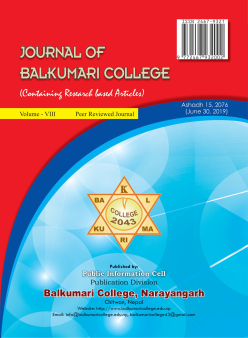Identity in Spirituality: A Review of the Play Chandalika by Tagore
DOI:
https://doi.org/10.3126/jbkc.v8i0.29306Keywords:
Dance play, untouchability, identity, Spirituality, ChandalikaAbstract
Rabindranath Tagore, the Nobel Prize winner for literature, is the first excellent Indian author whose creative efforts-poetry, prose, drama-present a superb Triveni of, mysticism, humanism and philosophy. His significant dance play Chandalika reveals the theme of marginal(Dalit) voice and role of Buddhism in the play. The play displays a chandal girl's realization that she's a human being like any other and it's wrong for her to believe under the notice of people from the upper castes. This play is about awakening a feeling of her identity in a Chandal-woman, and its awakened realization that she was born as a chandal-woman does not imply she is a non-entity. Prakriti finds that she is as human as anyone else, and that she has the right to give water to anyone high or low who requests that. Chandal girl in this play realizes that she isn't just someone with a personal identity but also causes her to love a Buddhist monk who is accountable for this new awakening.




